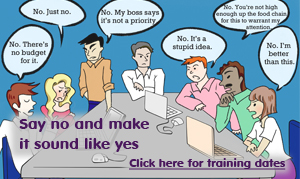It’s a cliché that bosses often say “Do as I say, not as I do”. But of course both matter. Leading well means doing both.
Read on to find some new reasons why what you do matters just as much, if not more, than what you say.
No 1: Your words do actually matter
In a corporate world where much of our communication is in writing, it’s clear that words matter.
The email subject line you choose can make a difference to whether someone reads it. The PowerPoint headline heralds good or bad news. The caption under a graph can make or break your meeting. So words do matter.
The story you tell and the frame you put around the company’s decision to increase sales targets, stop providing chocolate biscuits in the tea room, or replace a loved but incompetent receptionist helps the medicine go down. Or not. Words do matter.
Whether your procedures give people ways to solve problems or excuses to say “computer says no” that’s about the words you choose.
The company values: collaboration, trust, customer first, innovation. All words. And important ones. Living the company values, though, that’s action.
Which brings us to point number two.
No 2: Your actions matter too: we judge by actions not intentions
Your internal world is a closed book even to trained professionals. No one can fully read your mind, understand your thoughts or see your intentions. But people can see your actions.
You may mean to live the company values of collaboration and innovation, but people notice if you roll your eyes when a new idea is touted. Or if you sigh when a team member suggests a brainstorm. When you promote a competitive go-getting salesperson over the calm team-player people notice that too.
These are actions that make a difference.
No 3: Your boss is watching and looking for patterns
So why do actions matter? Because your boss is watching. And if your boss is smart (let’s hope so), they are looking for patterns of behaviour in your actions.
Belinda spends 3 days preparing a board presentation every quarter. She agonises over every single word on each PowerPoint slide until it’s letter perfect.She drives her staff crazy changing “the purpose of this report” to “this report’s purpose” and back again. She never sleeps the night before. She takes a beta-blocker before speaking to keep calm. On the spot, in front of the board, she holds her breath. Wrings her hands as she speaks. Crosses her feet. Fiddles with the buttons on her jacket. Her face gets redder and redder.
Watching her is uncomfortable for the board. Listening is harder. Belinda thinks the exposure is good for her career, but she’s damaging her reputation because the words she is saying: “I’m in control, and we’re doing well” belie her body language, which screams “I’m worried and something’s going to go wrong any moment”. Every word she utters is perfect. But her behaviours say “I can’t do this!”. In the eyes of the board she’s not professional at all, and her message is lost.
When there’s a disconnection between the words you say and what you do, your bosses believe your body every time. Because the body doesn’t lie.
Unfortunately Belinda’s issues are not gender-related: men do this too. We all overrate the importance of the words (yes, of course, they are important).
And we pay little attention to the non-verbals which can undermine (or support) every word we say.
You’ve worked hard to get to where you are. Your boss is watching you. If your boss is a fan of the One Minute Manager they’ll be trying to “catch you doing something right”. If they’re paranoid or if office politics is a little vicious where you are, then they’ll be making sure you’re not doing something wrong.
Leading well is about what you do in the hallway, how you control your emotional responses (or not) in meetings. These are your “tells”. Who you accidentally (or on purpose) sit next to in a meeting room. Which way you face when you choose a chair in a room. That’s leading well.
Your boss is watching you for signs that they can trust you. It’s a miracle more executives don’t take acting lessons, because composure, the ability to seem calm under pressure, is an essential trait for leaders everywhere. Because your actions speak louder than your words do.
No 4: Your staff are looking for reasons to trust you too!
Just as much as when you are presenting, you need to pay attention to what you say and what you do within earshot and sight of your staff, and the teams they manage.
The people who report to you have some understanding of your job. But the people who report to them (your grand-reports) are clueless. From their point of view you’re just floating into and out of meetings and occasionally addressing them. So they hallucinate, based what they can see, hear and experience in your behaviour. Most of which doesn’t relate to your job at all.
They judge by your emotional temperature, your level of agitation or calm, how kind or cutting you are with them. In the absence of other signals they’ll judge you by anything they can see, hear or notice.
For example, Felicity’s office is by the window on an open-plan floor. She needs to walk between her grand-reports to go anywhere. The kitchen conversation amongst her grand-reports always includes speculation about which teams she favours today, based on the route she chooses to cross the floor.
They don’t know what she does, so all they see is how she walks into and out of her office, and who she meets with. The more agitated she seems the more agitated they are. The calmer she is, then the easier they are. If she walks past their area they are the favourites and safe today. If they don’t then they may be under threat.
Why it matters is that this affects how your grand-reports do their jobs. You are responsible, like it or not, for the morale of your area and the areas below them, and so you need to convey that all is OK as much as is humanly possible.
Yes, leading well is tricky. So many people tell me that they would never want their boss’ job. Not because they couldn’t do the things they imagine the job entails, but because they don’t want to handle the stress of it. Yet research tells us that the people who are most stressed are middle managers, not executives: essentially stress is worst for people who feel they have no control over their jobs and their outcomes.
So what you do and what you say matters: you can rev up the troops all you like with half-time speeches about how well we’re doing or how much we’re changing, or how things will be better next week, but the staff watching you, and making judgements not just on the words, but on what they see you doing, and how you choose to wend your way to the kitchen.
Of course the important thing to remember is that people want to trust you.
In the film Dangerous Minds Michelle Pfeiffer teaches in a suburban school. At the beginning of term she announces that every member of her class gets an A. Their challenge is to maintain it till the end of term.
So it is with Execs. If you got through the front door you already have an A+. Your team and their teams assume you are competent and supposed to be there. No matter what your own mind tells you. We all know the imposter syndrome: we’re all just waiting for someone to tap us on the shoulder and say “We’ve worked it out, you are clueless, here’s a cardboard box for your desk paraphernalia, give us your security pass, you’re out of here”.
It is of course only inside our minds. Your staff and their staff and even your boss want you to succeed. It’s just a question of making sure that the words that you say and the actions you take are in synch with each other.
No 5: Your actions affect your mind, your presence and your resilience
The final reason why your words and your actions both matter is that your actions affect you at a mentally, physically and physiologically.
If you haven’t yet encountered Amy Cuddy’s TED talk on power poses then here is the potted summary: you can chemically improve your self-confidence and stress just by standing like Wonder Woman for three minutes. Your actions therefore change your mind. People can see this effect in your presence.
Whether you exercise, meditate, laugh, sleep or stretch, that changes your brain too. You become more resilient when you take your actions as seriously as your words.
It’s not just what you say. What you do matters.
Talk to Cindy about helping your team work smarter, faster and nicer.







